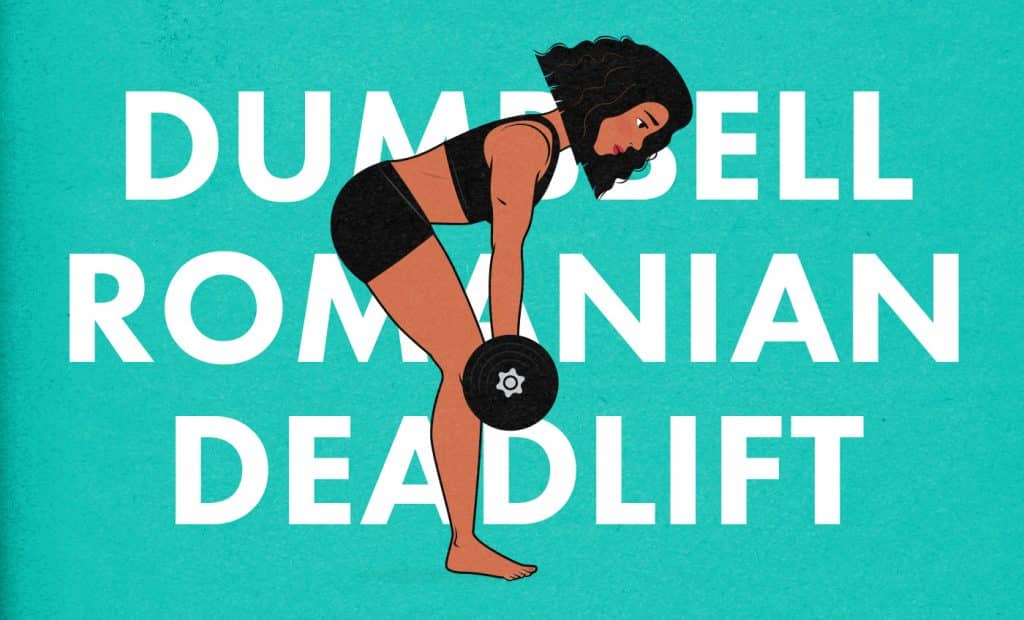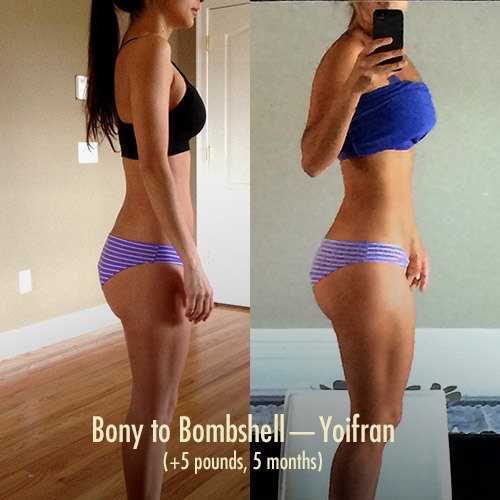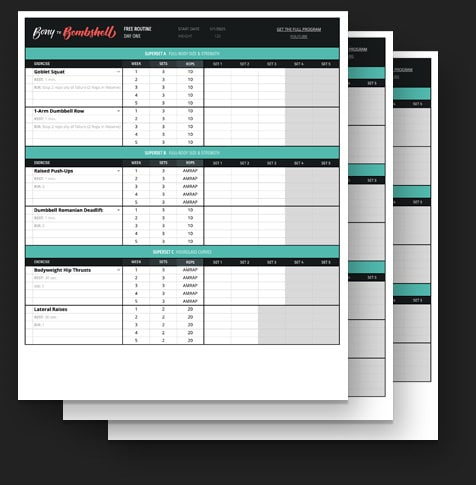
How to Do the Dumbbell Romanian Deadlift
The dumbbell Romanian deadlift is a big compound exercise that targets your hamstrings and glutes. It also improves hip mobility, strengthens your posture, and builds strength from the tips of your fingers to the tips of your toes.
- Dumbbell Romanian Deadlift: The Overview
- Common Dumbbell Romanian Deadlift Mistakes
- Using Dumbbell Romanian Deadlift In A Workout
- Frequently Asked Questions About The Dumbbell Romanian Deadlift
- Q: For the DB RDL, how heavy should my dumbbell be?
- Q: How often should I do the dumbbell RDL?
- Q: Can I do a dumbbell Romanian Deadlift at home?
- Q: How can I modify the dumbbell RDL? What are some variations?
- DB RDL Alternative—Barbell Romanian Deadlift
- DB RDL Alternative—Dumbbell Suitcase RDL
- DB RDL Alternative—Kettlebell Swings
- DB RDL Alternative—Single-Leg DB RDL
- What Next?
Dumbbell Romanian Deadlift: The Overview
The dumbbell Romanian deadlift (otherwise known as the RDL) is a compound lift that targets the following:
- entire posterior chain (the back side of your body)
- the hamstrings (back of thighs)
- the glutes
- postural muscles, such as the spinal erectors most easily seen on the lower back
To a lesser extent, the RDL will also train your forearms, upper back to stabilize the weight, etc.

Dumbbell Romanian Deadlift Video Demonstration
The key to this exercise is maintaining a neutral spine (straight line from your hips to your head) and making sure you sink back into your hips.
Here’s Marco coaching Marielle on how to do the dumbbell RDL with proper form:
Dumbbell RDL Proper Form Breakdown:
- First, grab two dumbbells that you can handle properly.
- Walk away from the dumbbell rack and find a place you have enough space to do the exercise.
- Stand with your feet hip-width apart, in a power position, as if you were going to jump.
- Get as tall as you can, stretch out, and take a deep breath.
- Pretend there’s a rope tied around your waist, and it’s pulling you backwards.
- Push those hips back while keeping your head in line with your body, keeping a “neutral spine.”
- Keep going back until you feel the tension in your hamstrings.
- Once there is enough tension, use your hamstrings like an elastic band to snap back up.
- Thrust your hips forward, using your glutes to get back into the starting position as powerfully as possible.
- That’s one rep.
A few extra pointers
- Keep the dumbbells close to your shins. Let the dumbbell fall into a natural path.
- Keep a neutral spine. What this means is that from your hips to your head should be a straight line. Your upper back shouldn’t be rounded over like a hunch. Don’t keep your head up to look forward. Keep your chin tucked, and let your head stay in line, so you may be looking at the ground when you’re at the bottom position of the rep.
- Don’t lock your knees. Keep a slight bend in your knees, don’t let them lock out. On the other hand, there shouldn’t be any knee bending as you do the exercise. This isn’t a knee-dominant exercise like the squat. It’s a hip-dominant one.
- It’s okay if your forearms give way first. If you’re brand new to this exercise, your forearms may be the weak link. That’s okay. After some rest, you’ll come back stronger. Eventually, your forearms will be strong enough, and you’ll be able to push your hamstrings/glutes.
- Add weight as you get stronger. As you get stronger over the weeks, gradually increase the weight of the dumbbells. Keep lifting heavier (with textbook form), and you’ll get curvier, stronger, and more athletic.
Mastering Neutral Spine Will Help With The RDL
Doing the dumbbell Romanian deadlift requires understanding what neutral spine is and hip hinging correctly. This means that your upper back isn’t rounded, your lower back isn’t sagging, and you aren’t contorting your neck up to stay looking forward. Instead, your back is in a completely straight line, which is what we call neutral spine.
Here’s a good video from Marco talking about what neutral spine is and some drills you can do to improve it.
The cool thing about neutral spine is once you learn it, it’ll help you everywhere else with lifting. Picking up a couch, picking up things off the floor, and even working in the garden.
Keep in mind that you won’t master this movement over night. Your brain will need to rewire, your stabilizers streghthen, etc. So with effort, and practice, your form and hinging will improve over time naturally.
Common Dumbbell Romanian Deadlift Mistakes
Setting Up The Stance Wrong
You don’t want to stand super-wide or narrow. Pretend like you’re going to jump. That’s your power position. Use that stance for the dumbbell RDL.
Bending The Knees Instead Of Sinking Back Into Your Hips
For whatever reason, there’s a whole generation of us that don’t know how to bend through the hips. Maybe it was wearing low-rise pants, and we learned to bend our backs and knee’s to pick up things instead of at the hips?
Bending the knees and staying more upright is a squat pattern, and it works the quads more. There’s nothing wrong with the squat, but we’re doing the RDL here.
Anyways, take a bit of time to practice this movement of sinking back into your hips. You can practice it at home in your bedroom too without any weights. Practice it around the house as you do chores. You’ll get it.
Choosing Too Heavy Of A Weight
When someone picks too heavy of a dumbbell, chances are they’re not going to do the whole range of motion that they could have. They might sit back and do the RDL a little bit, and that’s not going to challenge the hamstrings very well.
The deeper you sit back, the more it’ll stretch the hamstrings, and the better it’ll be for your leg growth. So lighten the weight, and choose a dumbbell that you can do 8-12 reps of pristine form with.
Using Dumbbell Romanian Deadlift In A Workout
Use A Moderate Rep Range
In research, to optimize for muscle growth and muscle size, you want to choose a weight that you can do 4–40 repetitions with. The sweet spot in real life, though, is the 8-12 rep range. The dumbbell Romanian deadlift is no exception.
If you find yourself not able to do 5 reps, use a lighter weight. If you can do more than 20 repetitions, use a heavier weight. That will guarantee that the workout is helping you gain both muscle size and muscle strength and not making endurance adaptations.
Challenge Yourself But Stop Shy Of Failure
Ideally, you’ll stop your set when you’re just about to fail and have a rep or two left in you. But if you’re a beginner, it’s hard to know exactly how hard you’re pushing yourself. If you aren’t sure if you’re taking your sets close to failure, try doing more reps. Try pushing yourself all the way until you can no longer do any more RDLs with perfect form. That way, you’ll know what it feels like. You might be surprised that you were a lot stronger than you thought. Next time, stop right before that point of failure.
Start With Two Sets, and Add More When Needed
Start with just a couple of sets, then over time, add more sets as you get stronger. We recommend doing two sets in the first week. Practice your form, find the right weights, and take your time learning the movement.
Next week, if you aren’t too sore at the start of each workout, try adding a set to each exercise. If that goes well and you feel ready for more, add another set next week. You can do around 3–6 sets per exercise. Most people will do best with 3–4 sets. If you ever start to feel worn down, or if you’re coming back after a long break, start the cycle over again, going back to just two sets per exercise and rebuilding from there.
Rest 1-2 Minutes Between Sets
How long you rest between sets of dumbbell RDLs isn’t that important. Whether you rest for 2 minutes or 10 minutes, you’ll still stimulate a similar amount of muscle growth. The important thing is that you rest long enough to catch your breath, ensuring that your cardiovascular system doesn’t limit the performance of your muscles.
We want to challenge your leg muscles, not just your heart (though your heart will get a good workout, too!).
The main reason to rest for just a couple of minutes is to keep your workouts shorter. You don’t want to spend all day in the gym. But if you need more rest or get interrupted partway through your workout, no problem. Just pick up where you left off.
If you want to blast through your workout even faster, you can do the lifts in a circuit/superset. Do a set of dumbbell RDLs, rest a minute, then do a set of raised push-ups, rest a minute, then do your second set of db RDLs, and then do your second set of raised push-ups. That way, you’re still giving different muscle groups plenty of time to recover between sets, but you’re doing another exercise during the rest period.
Free Routine For Female Beginners: Full Body Workout That Includes Dumbbell Romanian Deadlifts
If you don’t have a workout, you might be interested in our full Bony to Bombshell program. A sample beginner’s workout for women, with some priority given to the dumbbell RDL (doing the exercise first), could look like this:
- Dumbbell Romanian Deadlift: 2 sets of 10 repetitions.
- 1-Arm Dumbbell Row: 2 sets of 10 repetitions.
- Dumbbell Goblet Squats: 2 sets of 10 repetitions.
- Raised Push-Ups: 2 sets of as many reps as you can.
- Lateral Raises: 2 sets of 10 repetitions.
- Bonus Glute Work: 2 sets of glute bridges or hip thrusts
GET THE GOOGLE SPREADSHEET OF THE
FREE BEGINNER’S FULL-BODY WORKOUT For Women

Get the workout as a Google spreadsheet. You’ll be able to pick from exercise alternatives, fill out the sheet, and get our beginner’s warm-up.
Plus, we’ll make sure you’re on the Bony to Bombshell newsletter, and send you all of our best women's muscle-building content.
Frequently Asked Questions About The Dumbbell Romanian Deadlift
Here are some of the most common questions we’ve gotten from women about the dumbbell RDL:
Q: For the DB RDL, how heavy should my dumbbell be?
A: The weight of the dumbbell depends on your own level of strength. You will need to do trial and error, and the weight you use will depend on how fit and strong you are to start. Don’t let your ego choose. Pick a weight you can handle properly.
As a beginner, start with a weight that feels comfortable yet challenging. As you get stronger, it’ll get easier, and it’s time to raise the weight. Try to find a weight that will let you do 8–12 reps per leg with good form.
Keep in mind that if you pick something very light, like 5 pounds, it might make the DB RDL harder. That is because the weight is too light to give the hamstrings a good stretch. So don’t be afraid to lift heavier if it feels way too light. It might help your form improve.
Q: How often should I do the dumbbell RDL?
A: That depends on your goals, but we’re also big fans of this lift, so it’s one we include in the Bombshell programming a lot, so we might be a bit biased. If you want to master it, you can do this one every workout, realistically.
But if your goal is just to get general hamstring and glute growth, you’ll want to pair that exercise with other lower-body exercises for balanced growth. Think of things like dumbbell goblet squats and glute bridges.
Q: Can I do a dumbbell Romanian Deadlift at home?
A: Of course. You can do the dumbbell RDL at home if you have a dumbbell (or kettlebell). If you find that it gets too easy with the dumbbell you have, you can always do a slightly different variation to challenge yourself. Speaking of variations…
Q: How can I modify the dumbbell RDL? What are some variations?
A: If you’re new to the dumbbell Romanian Deadlift, stick to the classic form. You can get great muscle growth just by being patient, putting in the effort, and using heavier and heavier dumbbells over time as you get stronger. Even advanced lifters still use this lift, but they might be using 50-60-70 pound dumbbells, or they will eventually graduate to the barbell RDL to lift even heavier.
DB RDL Alternative—Barbell Romanian Deadlift
The barbell RDL will bring stability, allowing you to lift heavier. This will allow you to overload the main muscles, like the glutes and the hamstrings, even more. It takes more time to set up with the barbell, plates, and collars and is really only beneficial for heavier weights, so this is a more advanced variation.
DB RDL Alternative—Dumbbell Suitcase RDL
This RDL variation uses only one dumbbell, which means the weight is only on one side of the body. This can work stabilizer muscles, help to correct imbalances, and work the opposite side of your core, creating a more athletic body. It’s fun for a bit of variety.
DB RDL Alternative—Kettlebell Swings
Kettlebell swings are like the explosive version of the DB RDL. It’s a very similar movement where you’re sitting back into the hips, stretching the hamstrings, and then thrusting forward. The Kettlebell swings will be lighter in weight as you’ll almost always be doing more reps, and it is a fun one when you’re looking for more of a burn or to work on your cardio a bit with weights.
DB RDL Alternative—Single-Leg DB RDL
This is a unilateral exercise, which means it works one side at a time. It will take longer as you’ll have to do the left and right sides. The benefit is that you can help catch up muscular imbalances, making you more athletic. Also, because one leg at a time, you won’t need as much weight to stimulate the muscles. So it can be handy if you’ve maxed out your dumbbells or kettlebells. It can also be a fun one for a change of pace.
What Next?
By incorporating dumbbell RDLs into your lifting routine, your hamstrings, glutes, and general posture will be thanking you. If you liked this article, you’d love our muscle-building newsletter. We’ll keep you up to date on all the latest muscle-building information for women. Or, if you want us to walk you through the process of building muscle, including teaching you the lifts, giving you a full workout program, a complete diet guide, a recipe book, and online coaching, check out our Bony to Bombshell Program.



FREE women's Muscle Growth MINI-COURSE
Get our 5-part female bulking mini-course that covers everything you need to know about:
Here are some related articles